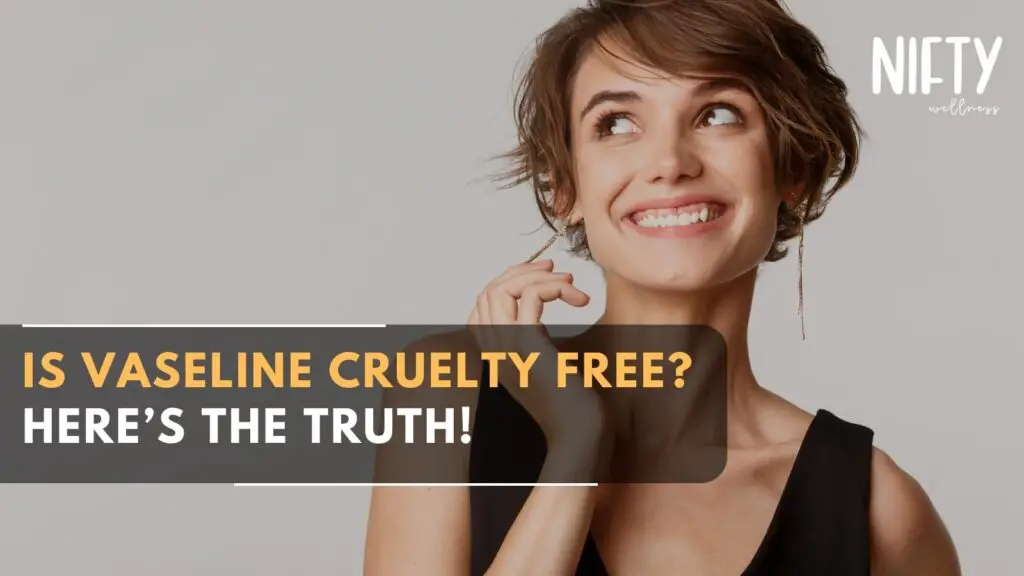Vaseline, the household staple found in countless medicine cabinets and beauty routines worldwide, has garnered its reputation for being a versatile and effective skincare product. Vaseline’s uses seem endless, whether moisturizing dry skin, preventing chapped lips, or soothing minor cuts and burns. However, a pertinent question lingers amidst its ubiquity: Is Vaseline cruelty free?
In this comprehensive exploration, we’ll look into the origins of Vaseline, understand its composition and benefits for the skin, and scrutinize the company responsible for its production—Unilever. We’ll address concerns about animal testing, investigate Vaseline’s vegan and non-comedogenic status, and even examine safety-related claims. By the end of this journey, we aim to unveil the truth about Vaseline’s cruelty-free status and provide the information needed to make an informed choice in your skincare routine.
The Origin of Vaseline
Since its establishment in 1870 by Robert Chesebrough, Vaseline has been on a remarkable journey spanning over 140 years, dedicated to alleviating dry skin. Robert Chesebrough set out on a mission to combat America’s dry skin concerns, laying the foundation for the iconic Vaseline products we know today.
Along this extraordinary voyage, Vaseline has played an integral role in historical milestones, as an essential companion during the North Pole Expedition, a trusted staple in World War I, and even forging partnerships, notably with Ponds. The brand has consistently evolved, introducing ground-breaking innovations like the Intensive Care™ Lotion and joining hands with Direct Relief for the Healing Project. Throughout its illustrious history, Vaseline has remained steadfast in its commitment to the healing and nurturing of skin.
Understanding Vaseline: Uses & Composition
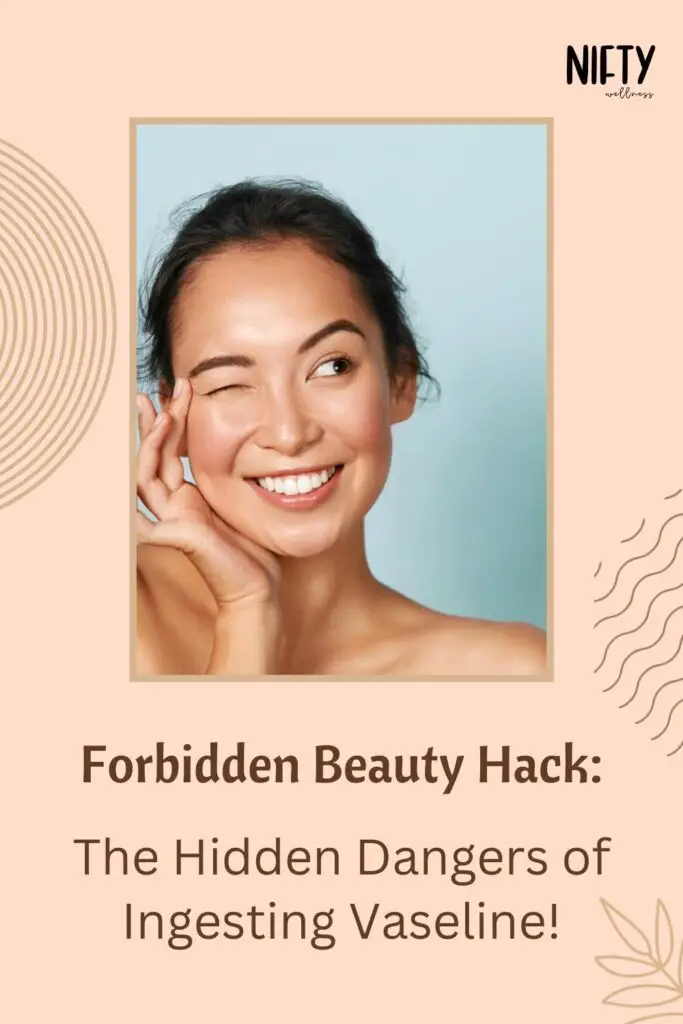
Before we dive into Vaseline’s cruelty-free status, let’s first understand, ‘What is Vaseline? What is Vaseline used for? And why is it so widely used?’ Vaseline is a petroleum jelly derivative known for its ability to lock in moisture and create a protective barrier on the skin’s surface. Its applications range from basic skincare routines to more specialized uses, such as removing makeup, soothing diaper rash, or preventing blisters.
So, what is Vaseline made of? Its primary ingredient is petroleum jelly, a semi-solid mixture derived from refining crude oil. Despite its petroleum origin, Vaseline is not the same as raw petroleum and undergoes a rigorous purification process to ensure it’s safe for use on the skin.
Interestingly, there’s a common misconception about the edibility of Vaseline. Many people wonder, ‘Is Vaseline edible?’ While it’s composed of materials considered safe for external use, it’s not intended for consumption. Vaseline is designed for topical application; ingesting it is neither recommended nor encouraged.
Skin Benefits of Vaseline & Safety
One of the most significant appeals of Vaseline lies in its skincare benefits. It’s renowned for its moisturizing properties, alleviating dry, chapped skin and preventing moisture loss. By forming a protective seal over the skin, Vaseline helps retain hydration and creates a barrier against harsh environmental factors.
But is Vaseline good for your skin? Many people strongly agree with the answer being yes. Its gentle, hypoallergenic nature makes it suitable for most skin types, including sensitive skin. In fact, the U.S. Food and Drug Administration (FDA) has recognized Vaseline as a safe and effective skin protectant, further solidifying its reputation as a skincare staple.
Check out our latest blog Is Innisfree Cruelty Free? Korean Skincare & Animal Testing. Discover the brand’s stance on animal testing and decide the best for your skincare needs.
Unilever’s Involvement & Company Practices
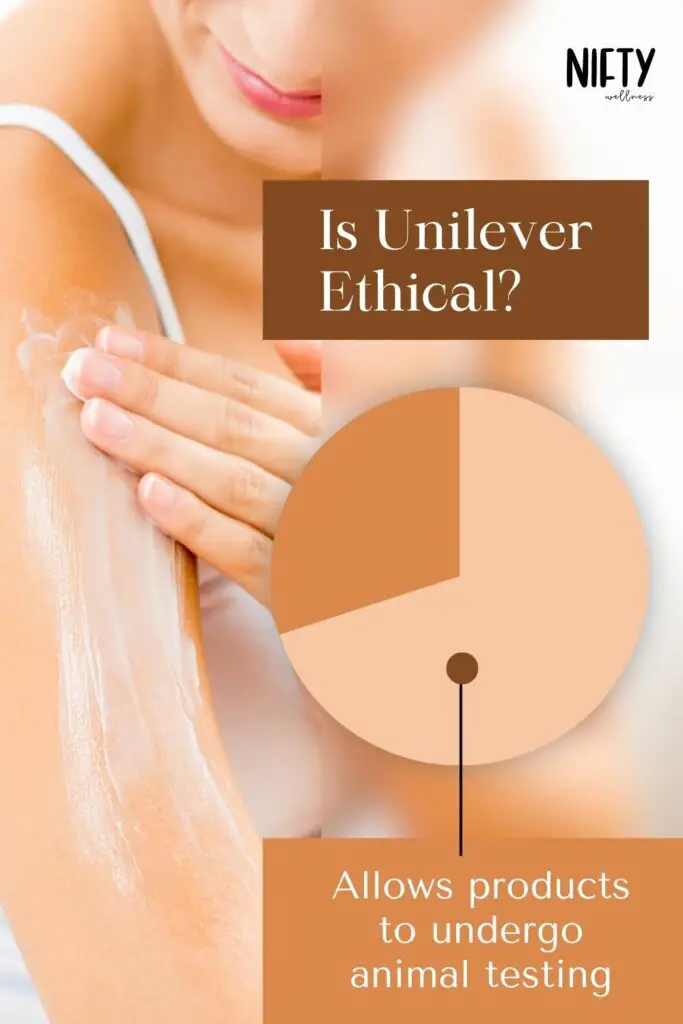
Understanding Vaseline’s cruelty-free status requires us to examine the company responsible for its production—Unilever. Unilever is a multinational consumer goods conglomerate with many brands, including Vaseline. It’s essential to assess the practices and values of this company to determine Vaseline’s stance on animal testing.
Unilever has made substantial efforts to align with ethical and sustainable practices. In recent years, the company has committed to eliminating animal testing from its product development process. This aligns with the global shift towards cruelty-free practices in the beauty and skincare industry. Unilever’s efforts also extend to promoting sustainability and ethical sourcing of ingredients, reflecting an evolving corporate ethos.
Animal Testing & Cruelty-Free Claims
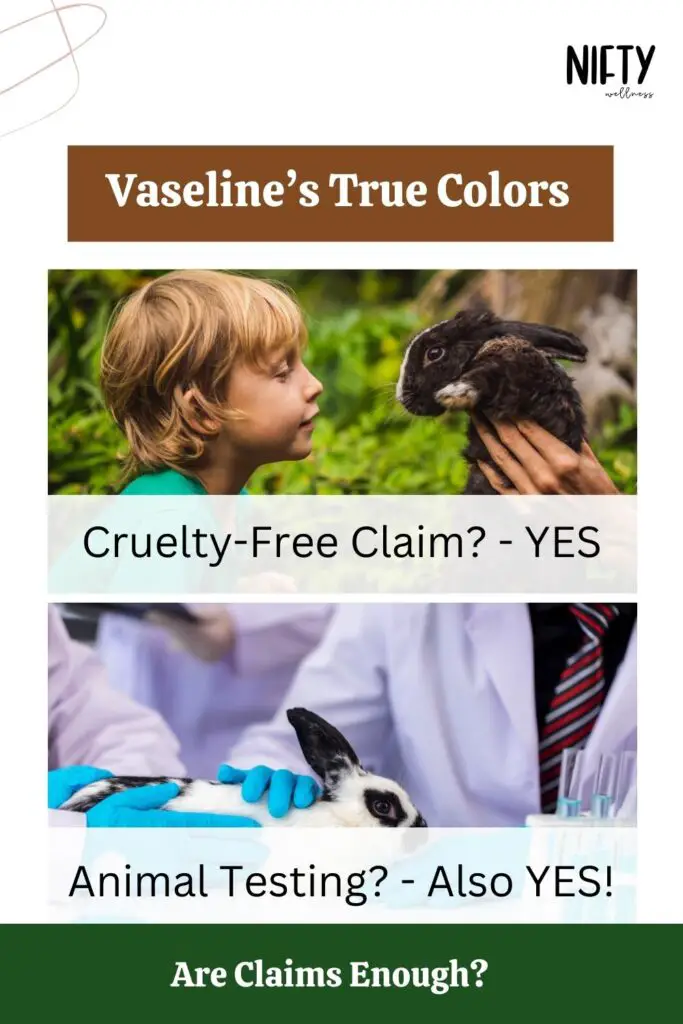
Now, let’s address the question: Does Vaseline test on animals? To understand the context of this question, we must acknowledge the historical prevalence of animal testing in the cosmetics industry. For many years, animal testing was a standard practice to assess the safety and efficacy of beauty and skincare products.
Nevertheless, there has been a substantial shift in this paradigm in recent times. Consumers worldwide have increasingly demanded cruelty-free products, prompting brands to reconsider their testing methods. Many companies, including those under the Unilever umbrella, have taken steps to eliminate animal testing.
While Vaseline’s website does not explicitly state its cruelty-free status, the broader context of Unilever’s commitment to ending animal testing suggests that Vaseline is moving towards a cruelty-free stance. The absence of recent information regarding animal testing associated with Vaseline further supports this transition. However, can a brand be called cruelty free based on its mere commitment?
Vaseline’s Vegan & Non-Comedogenic Status
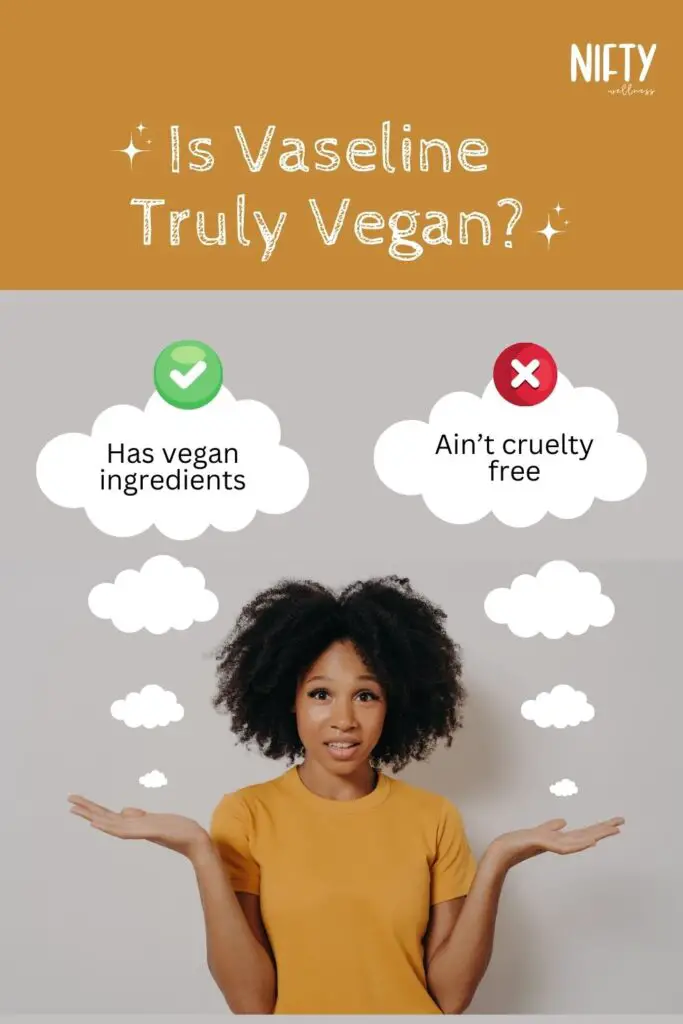
Beyond animal testing, some individuals also seek information regarding Vaseline’s vegan status. Is Vaseline vegan? The answer lies in its composition. Vaseline primarily consists of petroleum jelly, a derivative of crude oil. As such, it is considered vegan-friendly, as it does not contain animal-derived ingredients. However, individual definitions of veganism may vary, so one must consider personal values and preferences. Since it is not a certified cruelty-free brand, it can not technically be called vegan as well. If you want to know whether a product is Vegan, simply check the product ingredient lists to confirm.
Additionally, many individuals with specific skin concerns wonder if Vaseline is non-comedogenic, meaning it won’t clog pores or exacerbate acne. So, is Vaseline non comedogenic?
Vaseline’s occlusive properties create a barrier on the skin’s surface, which can help lock in moisture and support the skin’s natural healing processes. While some people find it beneficial for their skin, others may experience pore-clogging, so it’s advisable to patch-test and monitor your skin’s response.
Safety Concerns: Carcinogenic & Antibacterial Claims
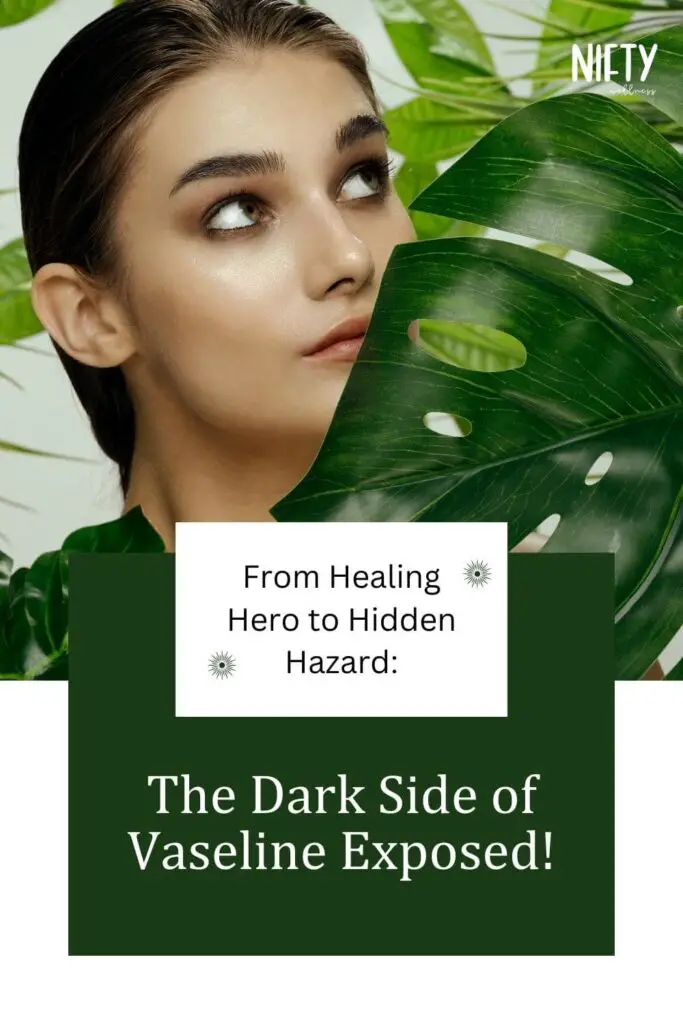
As with any widely-used product, concerns and rumours occasionally arise regarding Vaseline’s safety. A common query that repeatedly arises is, ‘Is Vaseline toxic?’ Regarding toxicity, two common discussion topics are whether Vaseline is carcinogenic and possesses antibacterial properties. So, ‘Is Vaseline antibacterial?’ and more importantly, ‘Is Vaseline carcinogenic?’
On the antibacterial front, Vaseline’s occlusive properties can create a barrier that may support the skin’s natural healing processes. While it’s not marketed as an antibacterial product, some individuals use it to protect minor cuts and burns. However, for specific antibacterial needs, it’s advisable to consult with a healthcare professional and use appropriate medical products.
Regarding carcinogenicity, Vaseline itself is not considered carcinogenic. It undergoes rigorous purification during refining to remove impurities, ensuring its safety for topical use. However, concerns have arisen regarding potential contaminants in certain petroleum-based products. It’s crucial to choose high-quality, reputable brands to minimize any risks.
Unveiling the Truth: Is Vaseline Cruelty Free?
To put it simply, Vaseline is not currently considered cruelty-free. The reason for this classification lies in the company’s policies regarding animal testing. Vaseline claims it does not conduct animal testing. However, it also states that it may allow its products to undergo testing on animals, either by themselves, their suppliers, or through third-party entities when mandated by law. This means that products falling under this category could be involved in animal testing, especially where local laws or regulations mandate such testing.
Vaseline’s parent company, Unilever, also does not meet the criteria for a cruelty-free brand. Unilever has outlined a policy that aligns with Vaseline’s stance on animal testing. While both entities claim not to conduct animal testing themselves, they allow their ingredient suppliers or governmental authorities to perform animal tests when required by law. This distinction is a critical factor in determining their cruelty-free status.
Furthermore, Vaseline lacks certification from third-party cruelty-free organizations like Leaping Bunny or PETA, which could have substantiated its cruelty-free claims independently. Without certifying itself as cruelty free Vaseline can not match its words and claims of being cruelty-free.
Read our latest blog Is Drunk Elephant Cruelty Free? The Truth is Out! Our analysis reveals the facts about Drunk Elephant’s ethical practices.
Conclusion
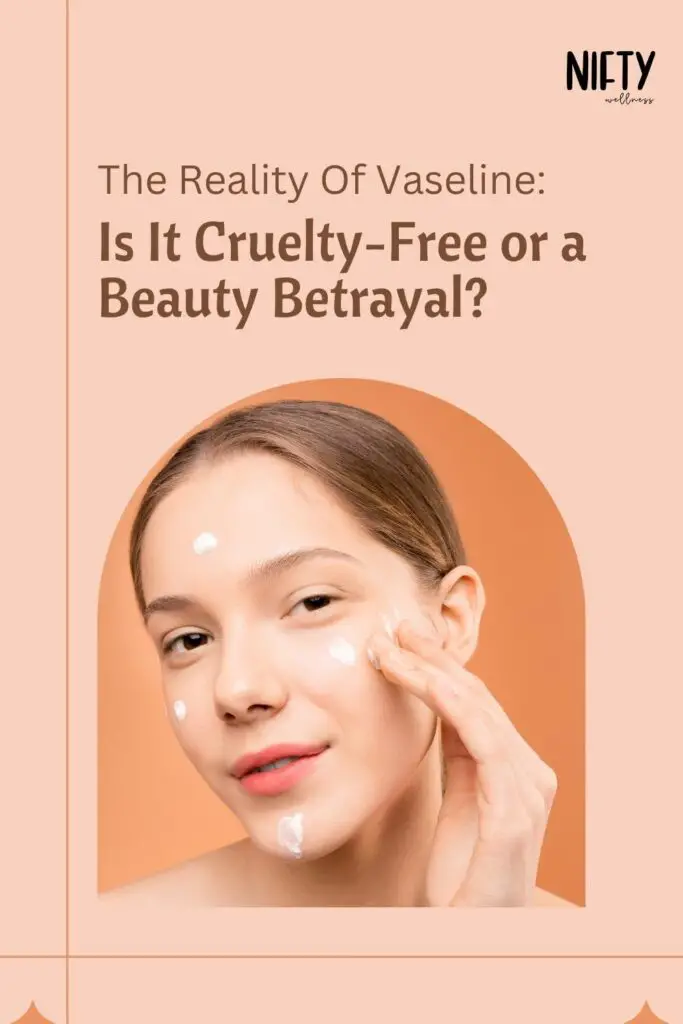
Vaseline is an iconic and versatile choice in the ever-expanding realm of skincare products. Its utility extends beyond the surface, offering comfort and healing to individuals worldwide. However, questions about cruelty-free status become paramount when choosing products that align with our values.
Through this exploration, we’ve unveiled the truth regarding, Is Vaseline vegan and cruelty free.
While Unilever Vaseline may not carry an official cruelty-free label, the overarching commitment of its parent company, Unilever, to end animal testing indicates a positive trajectory. Vaseline’s vegan-friendly and non-comedogenic properties make it an inclusive choice for various skincare needs.
In closing, the power lies with consumers to support brands and products that resonate with their ethical beliefs. By staying informed and making conscious choices, we contribute to a world where compassion and cruelty-free practices reign supreme. So, as you reach for that trusty jar of Vaseline, remember that your choices can shape the future of skincare.
Frequently Asked Questions (FAQs)
Are all Vaseline products cruelty-free?
Not all Vaseline products are cruelty-free. The cruelty-free status of a Vaseline product depends on factors such as where it’s sold and the local regulations. Some Vaseline products may undergo animal testing in regions where it’s legally required. To ensure you’re choosing cruelty-free options, check product labels, do research, and look for certifications from organizations like Leaping Bunny or PETA. These certifications indicate products that adhere to strict cruelty-free standards.
What is the Leaping Bunny certification?
The Leaping Bunny certification is a globally recognized symbol of cruelty-free products in the cosmetics, personal care, and household product industries. The Coalition for Consumer Information on Cosmetics (CCIC) is the entity that grants this recognition. To earn this certification, a brand must meet stringent criteria, ensuring that none of its products or ingredients are tested on animals at any production stage. The Leaping Bunny logo gives consumers confidence in choosing ethical and cruelty-free products.
Does Vaseline conduct animal testing for new products?
Vaseline, owned by Unilever, has stated that they do not test their products on animals and are committed to ending animal testing. Unilever claims to have complied with the EU animal testing bans for cosmetics since 2004 and supports similar global bans. However, they do allow their ingredient suppliers or government authorities to test on animals where required by law. So, while Vaseline itself may not conduct animal testing for new products, their stance allows for it in certain situations where legal requirements mandate it.
Are there alternatives to Vaseline for ethical consumers?
Yes, there are ethical alternatives to Vaseline for consumers who prefer cruelty-free and vegan options. Some brands offer similar petroleum jelly-based products that are certified cruelty-free and vegan. Two examples are Alba Botanica’s Un-Petroleum Multi-Purpose Jelly and Live Clean’s Non-Petroleum Jelly. These alternatives provide similar moisturizing and protective benefits to Vaseline while adhering to ethical standards that exclude animal testing and animal-derived ingredients.
How can consumers encourage cruelty-free practices?
Consumers can promote cruelty-free practices by choosing certified cruelty-free brands, researching animal testing policies, and supporting ethical companies. Contact brands, sign petitions, and educate others about cruelty-free options. Boycott non-cruelty-free brands and advocate for stricter animal testing regulations. Sharing information through social media can also raise awareness and drive positive change in the industry.
